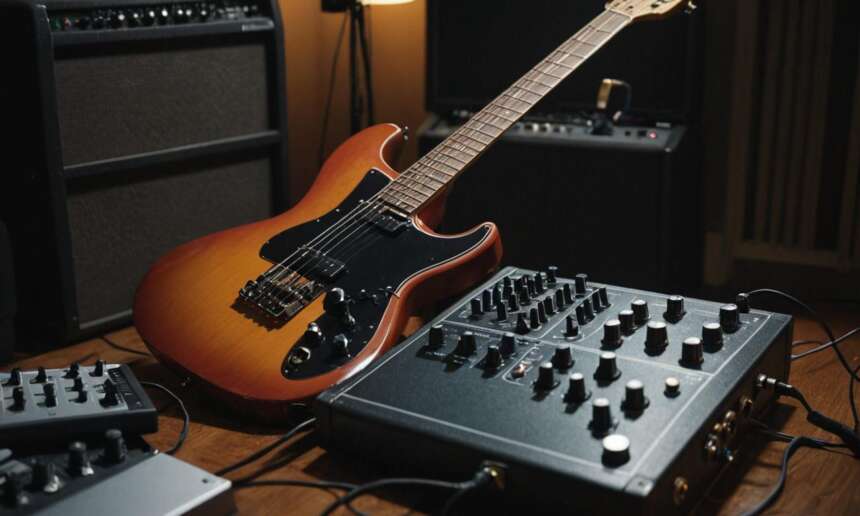Are you passionate about playing the guitar and interested in pursuing a career as a session guitarist? Becoming a session guitarist can be an exciting and rewarding journey, allowing you to showcase your musical talents while collaborating with various artists and musicians. In this guide, we’ll explore the steps you can take to establish yourself as a successful session guitarist.
Develop Exceptional Playing Skills
The first step in becoming a sought-after session guitarist is to hone your playing skills to a professional level. Dedicate time to practice regularly, focusing on techniques such as rhythm, lead, improvisation, and music theory. Mastering various styles of music, including rock, jazz, blues, country, and pop, will also enhance your versatility and appeal to potential clients.
Build a Diverse Repertoire
As a session guitarist, you’ll be expected to adapt to a wide range of musical genres and styles. Therefore, it’s essential to build a diverse repertoire that showcases your ability to play different types of music authentically. Learn popular songs across various genres and study the playing styles of influential guitarists to expand your musical vocabulary.
Network Within the Music Industry
Networking is crucial for establishing yourself as a session guitarist. Attend music events, workshops, and concerts to meet other musicians, producers, and industry professionals. Join online forums and social media groups dedicated to music to connect with potential collaborators and clients. Building strong relationships within the music community can lead to valuable opportunities for session work.
Create a Professional Portfolio
Aspiring session guitarists should create a professional portfolio showcasing their skills and experience. Record high-quality audio and video samples of your playing across different genres to demonstrate your versatility and proficiency. Additionally, consider creating a website or online portfolio where potential clients can view your work and contact you for session opportunities.
Be Reliable and Professional
Reliability and professionalism are essential traits for session guitarists. Always arrive punctually for rehearsals, recording sessions, and performances, and be prepared to adapt to changing circumstances. Maintain a positive attitude, collaborate effectively with other musicians, and strive to deliver exceptional performances consistently. Building a reputation for reliability and professionalism will increase your chances of being hired for session work.
Seek Opportunities for Experience
Seek out opportunities to gain experience as a session guitarist, even if they are unpaid or low-paying initially. Offer to collaborate with local artists, participate in jam sessions, and volunteer for recording projects to build your portfolio and network within the industry. Every opportunity to perform and collaborate will contribute to your growth as a musician and increase your visibility as a session guitarist.
Market Yourself Effectively
Effective self-promotion is essential for attracting clients and securing session work. Utilize social media platforms, such as Instagram, Facebook, and LinkedIn, to showcase your skills and connect with potential clients. Create engaging content, such as performance videos, tutorials, and behind-the-scenes footage, to showcase your talent and personality. Additionally, consider partnering with music agencies and joining online platforms that connect musicians with session opportunities.
Continuously Improve and Adapt
The music industry is constantly evolving, so it’s crucial to stay informed about emerging trends and technologies. Continuously seek opportunities to improve your skills, whether through private lessons, workshops, or online courses. Remain open to feedback and be willing to adapt your playing style to meet the needs of different projects and clients. By staying proactive and adaptable, you’ll position yourself for long-term success as a session guitarist.
Becoming a session guitarist requires dedication, skill, and perseverance. By honing your playing skills, building a diverse repertoire, networking within the industry, and marketing yourself effectively, you can establish yourself as a sought-after session guitarist. Remember to remain reliable, professional, and continuously strive for improvement to maximize your opportunities for success in this competitive field.
Frequently Asked Questions
Here are some common questions about becoming a session guitarist:
| Question | Answer |
|---|---|
| 1. How important is networking for session guitarists? | Networking is crucial for session guitarists as it helps in establishing connections with other musicians, producers, and industry professionals, leading to potential opportunities for session work. |
| 2. Is it necessary to specialize in a particular genre as a session guitarist? | While it’s beneficial to be versatile across various genres, specializing in a particular genre can also be advantageous as it allows you to become known as an expert in that style of music. |
| 3. How can session guitarists ensure they maintain professionalism? | Session guitarists should prioritize punctuality, preparedness, and effective collaboration with other musicians. Maintaining a positive attitude and delivering consistent performances also contribute to professionalism. |
| 4. What are some effective marketing strategies for session guitarists? | Utilizing social media platforms, creating an online portfolio, partnering with music agencies, and actively seeking out opportunities to showcase skills are effective marketing strategies for session guitarists. |
| 5. How can session guitarists stay relevant in a constantly evolving music industry? | Session guitarists should stay informed about emerging trends and technologies, continuously seek opportunities for skill improvement, and remain adaptable to the changing needs of projects and clients. |
Expanding Your Repertoire
One way to enhance your repertoire as a session guitarist is to explore lesser-known genres or fusion styles. This not only broadens your musical vocabulary but also makes you more versatile and attractive to a wider range of clients.
Collaborating with Producers
Developing strong relationships with producers can lead to consistent session work. Producers often have connections with various artists and projects, making them valuable allies in your journey as a session guitarist.




